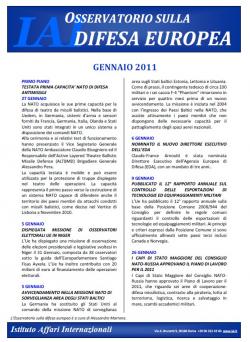Observatory on European defence, October 2002
4-5 October 2002
Informal Meeting EU Defence Ministers
An informal meeting of EU Defence Ministers, with the participation of EU High Representative Solana and NATO Secretary General Robertson, was held in Crete. The focus of the discussion was on development of the European reaction force and relations with NATO before the Prague Summit in November. The Ministers examined the work done in the last 6 months by the 17 groups on capability shortfalls; the groups should finish their analysis within the first semester 2003. The Ministers also discussed the US proposal to establish a NATO Response Force for high-intensity operations, made in Warsaw on 25 September and, in particular, the relations between this force and the European one. The need to operationalize the “Berlin +” arrangement with NATO emerged once more, in the light of possible future operation in the Balkans.
24-25 October 2002
European Council - NATO participation in ESDP missions
The European Council in Brussels approved a document on the involvement in ESDP of the European NATO members which are not part of the EU, according to the provisions of the Nice Summit. The agreement establishes a framework that allows the non-member states permanent consultation, participation in planning, exercises and real operations conducted by the EU. When an autonomous operation occurs, the Council will invite the partners to participate, taking particular care of their immediate interest in the area concerned. In case of operations involving the use of NATO resources, the partners will be able to take part according to the procedures established by the Atlantic Alliance.
The agreement among EU members represents a significant step towards the definition of relations between the EU and NATO before the actual deployment of the European force occurs. The mechanism for consultation and participation proposed seems to encourage the strong involvement of external partners in ESDP operations; this will increase the probability Turkey accepting the definitive EU-NATO agreements.
28 October 2002
European Convention 2004 - Defence
The President of the Convention on the future of Europe, Giscard d’Estaing, presented the first proposal of a European Constitution, which includes the considerations of the working group on Defence, chaired by Commissioner Michel Barnier. According to the draft, the document should recall the principle of solidarity between member states; this will implicitly mean the establishment of relations of mutual support in the event of a crisis that threatens the existence or the fundamental interest of each country, similar to the one already existing between NATO and WEU members (according to Article 5 of their respective Treaties). Moreover, a stability pact on defence was proposed to guarantee correct burden sharing, as well as the creation of a common European Armaments Agency. The coordination between Foreign Policy, Defence Policy and the stabilization missions is still undefined and is strictly connected to future relations between the Commission and the EU Council.
The “skeleton” proposed by the Convention is quite ambitious and proposes significant advancements towards the comunitarization of the CFSP and ESDP. Moreover, the inclusion of a solidarity clause opens the door for the involvement of the Union not only in crisis management operations, but also in the area of territorial defence and high-intensity military operations, nuclear deterrence included. These proposals will be discussed and probably criticised by those governments less willing to share their defence sovereignty, such as the United Kingdom. Those countries more willing to develop a security policy in the European framework, such as France, will probably support the Convention document . The direction followed by the Convention seems correct, but it is still unclear if this initiative will succeed. The proposals and considerations of the member states will soon follow. The Convention represents a unique opportunity for the development of a European defence policy.
October 2002
Defence Budgets
The international situation underlines the importance of defence structures to serve common security and face new threats; therefore, the problem of the level of resources dedicated to defence has become a crucial issue. In Europe, only two countries, France and the United Kingdom, are going to follow the path of steep budget increases decided by the United States. The US defence budget is getting closer and closer to $400 billion per year , while the UK government has decided on an increase of £3.5 billion in 5 years to ensure a budget over £31 bn a year and the French government has proposed a 5-year planning law that will allow for spending in excess of €31 bn from 2003 on. In the other principal European countries such as Germany (the 2003 budget reaches €24 bn) and Italy (€17 bn), the trend is a decrease in defence spending, in particular in procurement, because of the rise in public deficit. This trend is likely to undermine the evolution of European and Atlantic defence policies: the present budgets do not guarantee the ongoing reform of the military instruments. Therefore, it is critical to spend better, resorting also to multinational pooling of resources.
-
Details
Roma, Istituto affari internazionali, 2002 -
Issue
02/10



